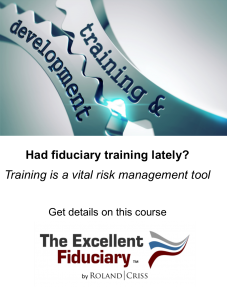Article
Not that long ago, advocacy groups for employee benefit plan (“EBP”) service providers began promoting the notion that “fiduciary excellence” related only to investment decision-making in pension and retirement plans.
Revelations of rampant overcharging for vital services like recordkeeping and investment advice, consolidation of vendors, new regulatory initiatives targeting EBP fiduciaries, and an explosion of data security breaches by recordkeepers, investment firms, and healthcare providers forced a change in how EBP fiduciary duty is understood.

Savvy human resources (“HR”) and finance leaders have realized that the dimensions of their EBP oversight responsibilities also require governance, administration, and control skills.
They’ve learned, some the hard way, that those skill sets are equally, if not more, critical than the aforementioned investment discipline and must include health and welfare programs. This modern way of thinking is essential for achieving fiduciary excellence and Principled Performance.
The Goal of Principled Performance
Applied to the EBP fiduciary environment, Principled Performance enables prudent decision-making across all fiduciary disciplines in the 4D Framework (i.e., governance, administration, investments, and controls) while considering threats and opportunities and honoring mandatory commitments, including legal compliance and voluntary promises found in mission, vision, and values statements, contracts, and employee agreements.
The focus on Principled Performance is ideally matched to the fiduciary role because it emphasizes the priority of process over outcomes.
Resilience is the ability to withstand and adapt to challenges, disruptions, and changes, while maintaining essential functions and quickly recovering from setbacks.
Building Organizational Resilience
Resilience, or the capacity to flourish in the face of persistent disturbance, quickly develops into an “always-on” imperative for EBP fiduciaries. In order to increase collective agility, improve responsive decision-making, and ensure an ecosystem-wide perspective that benefits all stakeholders, resilience requires “whole-system” cooperation and strategic vision.
As a result, cross-functional collaboration is at the core of a resilient EBP management system.
Additionally, this resilience helps gain employee confidence in an organization’s ability to withstand disruptions and assure the success of digital and workforce reforms.
Prioritizing these challenges will take focus, creativity, and some risk-taking. Tackling them together will increase an HR organization’s resilience and relevance.
There will be many dependencies along the way—a fluency in digital systems, a resilient organizational culture, collaboration with information technology, and improved knowledge of fiduciary best practices at the committee level, to name just a few—but one thing is clear: yesterday’s fiduciary doctrines are insufficient. Principled Performance is the backbone of a fiduciary management approach that enables excellence across all disciplines.
The Road Ahead
Accept the “new basics.” Discover the links between them. As they balance short-term priorities with your response to the existential drivers of change, push your teams to undermine conventional systems. Future-ready organizations are already mining opportunities. Avoid falling behind.




